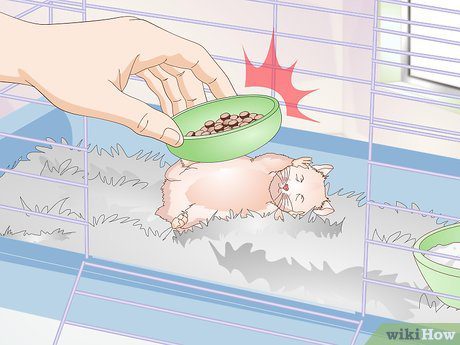Hamsters typically wake up at dusk, which is usually around sunset time. Hamsters are adorable and popular pets known for their nocturnal nature.
They are most active during the night, as they are crepuscular creatures, meaning they are more active during twilight hours. It’s important to understand their natural sleeping pattern to ensure they have a comfortable and stress-free environment. We will discuss the daily routine of hamsters, their sleep patterns, and how to create the ideal habitat for them.
By understanding their behavior, you can provide the best care for your furry friend. Let’s explore the fascinating world of hamster sleep patterns and uncover the secrets of their daily routine.
The Sleep Patterns Of Hamsters
Hamsters typically wake up at dusk and are most active during the night. Their sleep patterns align with their natural nocturnal behavior. It’s important to provide a quiet and undisturbed environment during their waking hours.
Nocturnal Creatures
Hamsters are nocturnal creatures, which means they are most active during the night and prefer to sleep during the day. This is a key behavior trait that has been observed in various species of hamsters. Their nighttime activity helps them avoid predators and allows them to forage for food undisturbed.
Natural Habitat
In their natural habitat, hamsters live in burrows underground. These burrows provide them with protection, warmth, and a safe environment to sleep during the day. This behavior has been adapted by pet hamsters as well, as they tend to create nests in their cages to mimic their natural sleeping habitats.
Light Sensitivity
Hamsters have a high sensitivity to light, and bright lighting can disrupt their sleep patterns. Exposing them to excessive light during the day can lead to sleep deprivation and stress. It is important to provide a dark and quiet environment for them to rest during their sleep hours.
Pattern Variations
While most hamsters are nocturnal, there can be variations in their sleep patterns depending on their species and individual personalities. Some hamsters may have a more crepuscular behavior, which means they are most active during dawn and dusk.
Duration Of Sleep
A typical hamster sleeps for around 12-18 hours per day. This extended period of sleep allows them to conserve energy and maintain their overall well-being. However, it is not uncommon for hamsters to wake up periodically during their sleep to eat, drink, and explore their surroundings.
| Species | Hours of Sleep |
|---|---|
| Syrian (Golden) Hamster | 12-14 hours |
| Dwarf Hamsters | 16-18 hours |
Creating A Sleep-friendly Environment
- Place the hamster’s cage in a quiet area, away from loud noises and bright lights.
- Ensure the cage is well-ventilated and provides a comfortable temperature for the hamster.
- Provide nesting materials, such as shredded paper or soft bedding, for the hamster to create a cozy sleeping area.
- Keep a consistent feeding schedule to prevent disruptions during the hamster’s sleep hours.
By understanding the sleep patterns of hamsters and providing them with a sleep-friendly environment, you can help ensure their overall well-being and promote their natural behaviors.
Hamsters’ Wake-up Time
Dawn And Dusk Activity
Hamsters, as crepuscular animals, are most active at dawn and dusk. This means they wake up at twilight and spend time foraging for food and exercising in the evening.
Adaptation To Domestic Life
Hamsters in the wild have a nocturnal lifestyle but they’ve adapted well to domestic life. They can adjust their waking hours to coincide with the times when their human companions are awake.
Factors Influencing Hamsters’ Wake-up Time
Factors such as environmental conditions, natural instincts, and daily routine influence the wake-up time of hamsters. By understanding these factors, owners can create a comfortable environment and establish a consistent routine for their furry friends.
Factors Influencing Hamsters’ Wake-Up Time Hamsters are known for their nocturnal behavior, often being most active during the night. However, the specific wake-up time for hamsters can be influenced by various factors. Understanding these factors can help pet owners provide the best care and environment for their furry friends. Light and Darkness Cycles “`htmlLight And Darkness Cycles
“` Hamsters are sensitive to light and darkness, as they are crepuscular animals. The natural cycle of light and darkness in their environment can significantly impact their wake-up time. Light exposure typically triggers hamsters to become active, while darkness signals them to rest. This means that the light patterns in a hamster’s environment can affect their wake-up time. Ensuring a consistent light and darkness cycle in their habitat can help regulate their natural rhythms, promoting a healthy and regular wake-up time. Food Availability “`htmlFood Availability
“` The availability of food can also influence a hamster’s wake-up time. As creatures with a keen sense of smell and foraging instincts, hamsters may become active in anticipation of food. If food is consistently provided at a certain time, hamsters may adjust their wake-up habits to coincide with the availability of food. Pet owners can use this knowledge to establish a routine for feeding their hamsters, which can in turn influence their wake-up time. By providing food at the same time each day, hamsters may naturally wake up around that time. Understanding these factors is crucial for creating an optimal environment for pet hamsters, ensuring they have the opportunity to exhibit their natural behaviors and thrive in captivity. By considering the impact of light and darkness cycles and food availability, pet owners can help their hamsters maintain a healthy wake-up routine.
Credit: www.reddit.com
How To Encourage Hamsters’ Activity
Welcome to another helpful post on how to encourage your adorable hamster’s activity! Creating a suitable environment and providing engaging toys and activities are two key aspects to ensure your hamster stays active and healthy. In this section, we’ll explore these techniques in detail.
Creating A Suitable Environment
One way to encourage your hamster’s activity is by creating a suitable environment. Hamsters are naturally active animals, and it’s important to give them the right space to explore and play. Here are some tips for creating an ideal environment for your furry friend:
- Provide a spacious cage or enclosure:
- Add bedding material for comfort:
- Ensure proper lighting:
- Keep the temperature and humidity levels stable:
Hamsters require enough room to move around, stretch, and burrow. A cage with multiple levels or an enclosure with ample floor space is ideal. Avoid confining your hamster to too small a space.
Choose a suitable bedding material like wood shavings or paper-based bedding. It not only provides warmth and comfort but also allows your hamster to burrow and indulge in natural behaviors.
Hamsters are most active during twilight and nighttime hours. Mimic their natural habitat by providing a dim and cozy environment in their enclosure. Use gentle lighting that won’t disturb their sleep during the day.
Hamsters are sensitive to extreme temperatures. Maintain a comfortable temperature range between 65°F to 75°F (18°C to 24°C) and humidity levels around 40-70%. Avoid placing their enclosure in direct sunlight or drafty areas.
Engagement With Toys And Activities
Another great way to encourage your hamster’s activity is through toys and activities that stimulate their natural instincts. Here are some ideas to keep your hamster entertained:
- Provide a variety of chew toys:
- Introduce exercise wheels or balls:
- Offer hiding spots and tunnels:
- Rotate toys and activities:
Hamsters have constantly growing teeth, and providing chew toys helps to prevent overgrowth and keeps their teeth healthy. Choose safe, hamster-friendly chew toys made of wood or other non-toxic materials.
Hamsters are known for their love of running, and exercise wheels or balls are great options to satisfy their need for movement. Ensure the wheel or ball is the right size for your hamster and made for their safety.
Hamsters are natural burrowers and enjoy having hiding spots and tunnels to explore. You can provide tunnels made of cardboard or plastic, or even empty toilet paper rolls, to keep them engaged and entertained.
Keep your hamster’s environment exciting by regularly introducing new toys and rotating their availability. This helps prevent boredom and ensures they remain mentally stimulated.
By creating a suitable environment and providing engaging toys and activities, you can motivate your hamster to stay active and happy. Remember to observe your hamster’s preferences and adjust their surroundings accordingly. Happy hamsters make for lively and delightful companions!
Signs Of A Happy And Healthy Hamster
A happy and healthy hamster usually wakes up at dusk, as they are crepuscular creatures. Witnessing your hamster active and moving around during the evening hours is a positive sign of their well-being and contentment. Ensuring they have a balanced diet, a clean environment, and regular exercise will contribute to their overall health and happiness.
Active And Alert Behavior
One sign of a happy hamster is its active and alert behavior. Happy hamsters are energetic and curious, frequently exploring their surroundings.
Proper Sleep Patterns
Another indication of a healthy hamster is its proper sleep patterns. Hamsters are nocturnal creatures, so they tend to wake up during the evening and are active throughout the night.

Credit: www.wikihow.com

Credit: www.reddit.com
Frequently Asked Questions On What Time Do Hamster Wake Up
What Is The Typical Waking Time For Hamsters?
Hamsters are nocturnal animals, typically waking up in the evening and remaining active throughout the night.
How Can I Help My Hamster Adjust To Its Waking Schedule?
Gradually shift feeding and playtime to align with your hamster’s natural nocturnal habits for a smoother transition.
Do Hamsters Wake Up During The Day?
Hamsters may wake briefly during the day to eat or drink, but they are most active during the night.
Is It Normal For Hamsters To Be Awake At Irregular Times?
Yes, occasional waking during daytime hours is normal depending on individual hamster behavior and external stimuli.
Conclusion
Understanding the waking habits of hamsters is crucial for their well-being and your interaction with them as pets. By recognizing their nocturnal nature, providing a suitable environment, and maintaining a consistent routine, you can ensure a harmonious coexistence with your hamster.
Remember, a happy and well-rested hamster makes for a content and satisfied owner. Keep these tips in mind to foster a positive and enjoyable bond with your furry friend.
- understanding hamster body language - April 22, 2024
- In The Wild: Exploring The Lives Of Wild Hamsters - April 22, 2024
- Leaky Bladders And Urinary Woes: Understanding Hamster Urinary Issues - April 22, 2024


